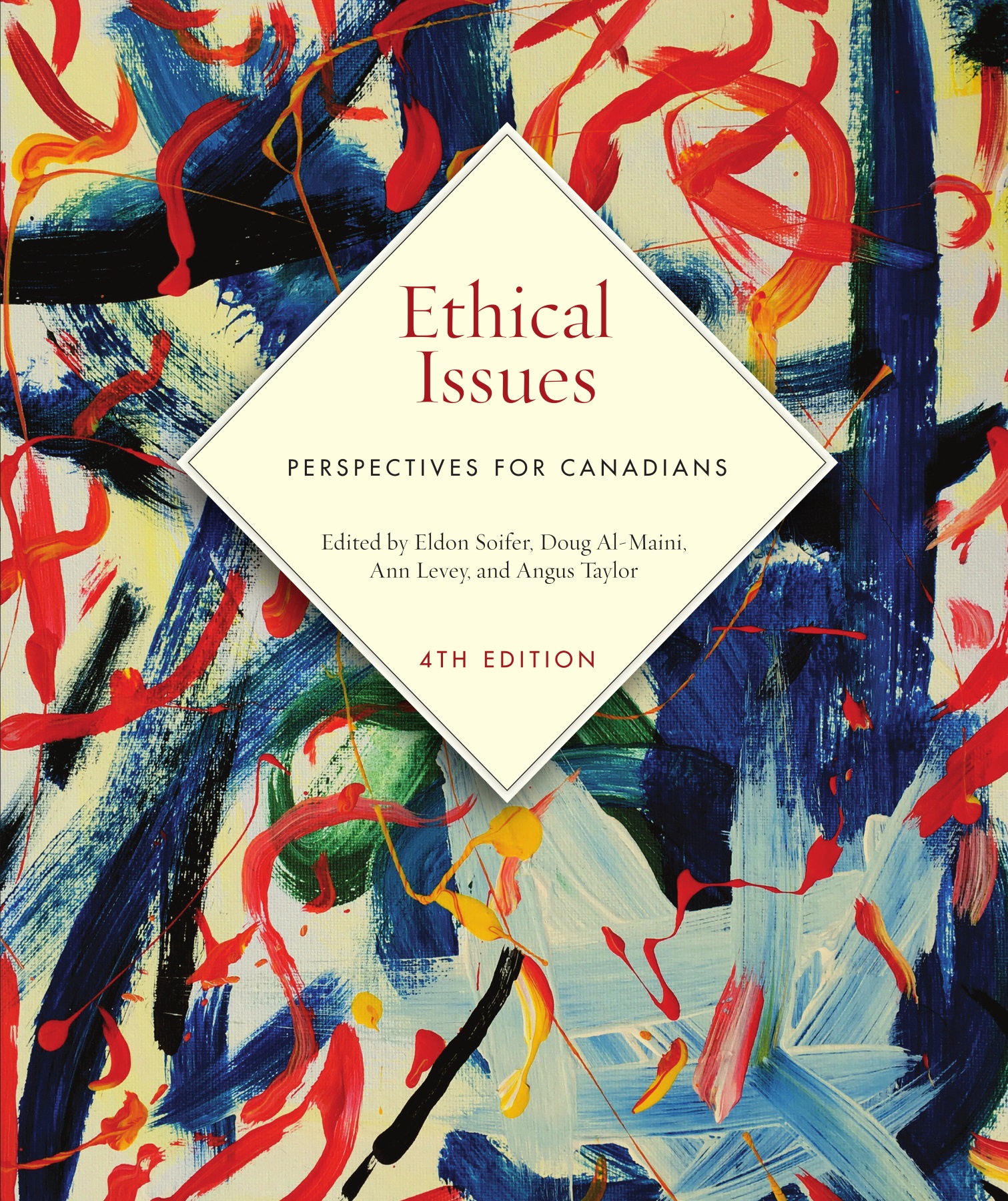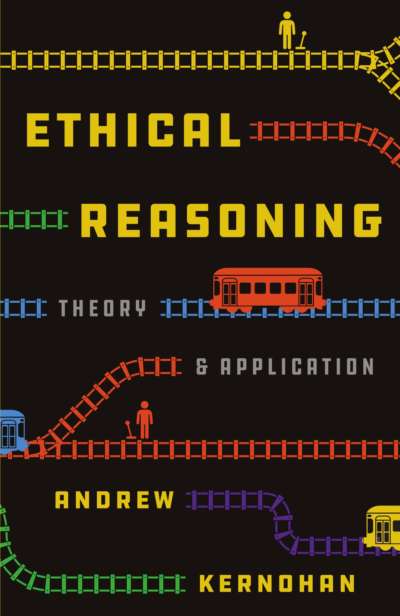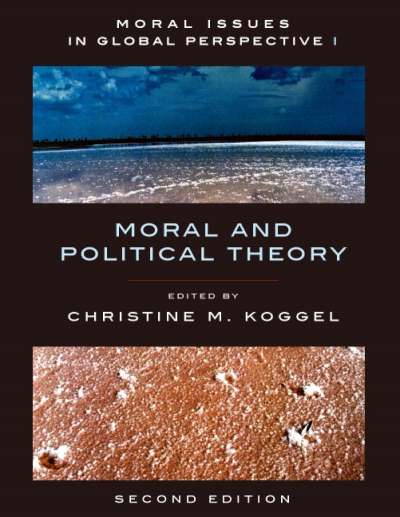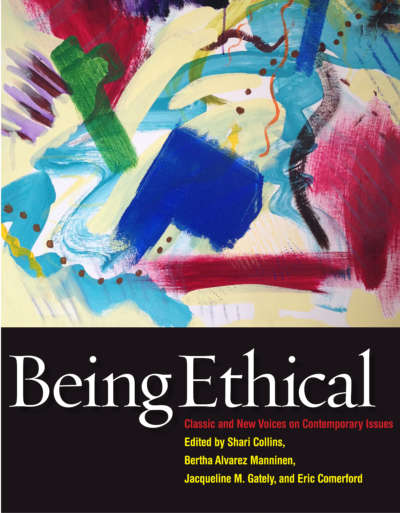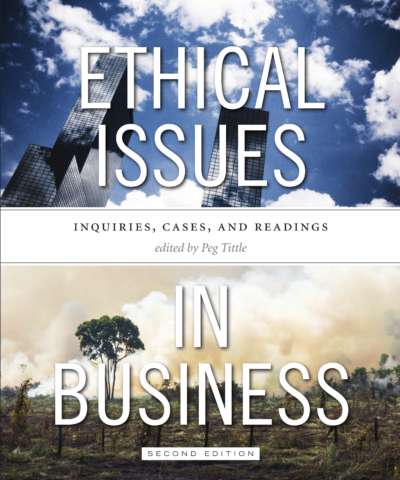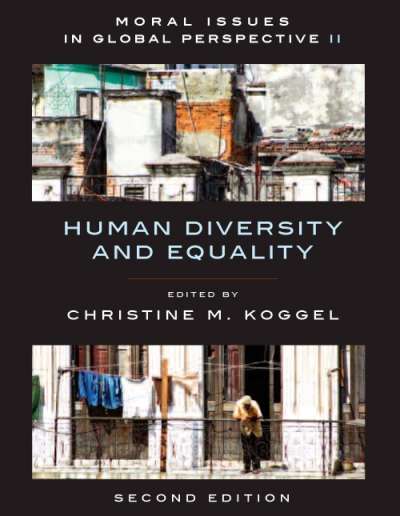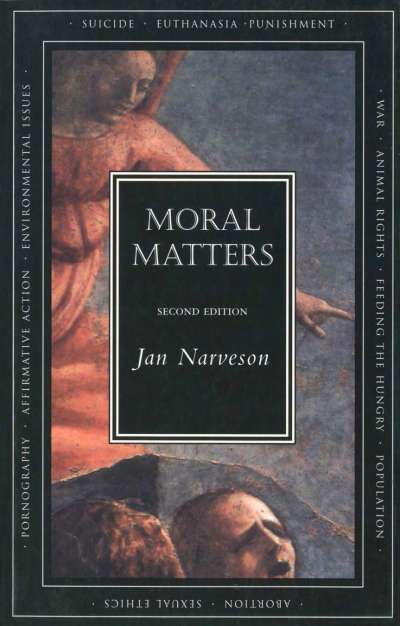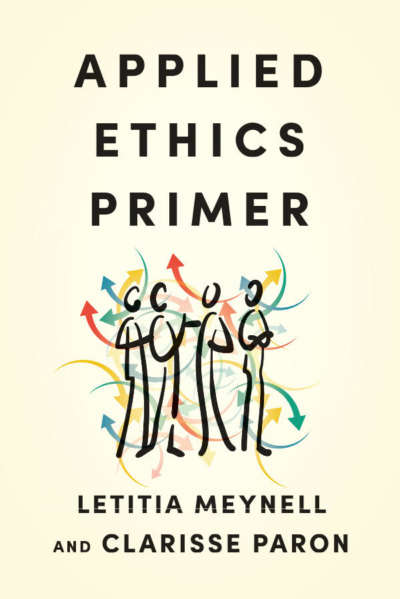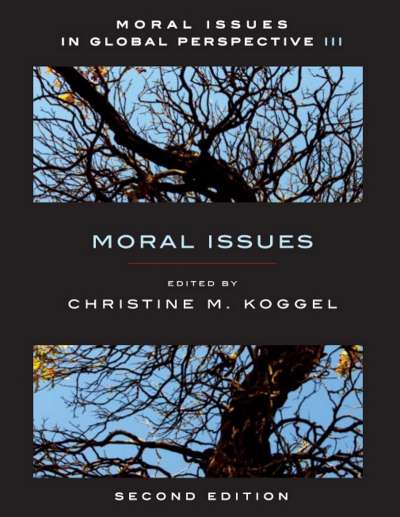Ethical Issues: Perspectives for Canadians is a collection of readings designed to introduce students to a number of important topics, including our obligations toward the environment, the treatment of non-human animals, abortion, assisted reproduction, end of life decision-making, freedom of expression, war, multiculturalism, and more. Readings have been carefully selected to represent a broad array of perspectives and arguments. Relevant legislation, court cases, and other non-philosophical works complement the writings of professional philosophers to provide students with multiple approaches to the issues. Brief introductions and discussion questions are provided for each reading, and a general introduction to the basic ethical theories is included.
This book can be purchased on its own or packaged with The Ethics of Pandemics for an additional $10. If you wish to order a package, please contact your Broadview representative or customer service.
Comments
“This anthology provides a great introduction to contemporary ethical issues, and it is a particularly valuable resource for anyone seeking a distinctively Canadian perspective. The editors’ selections strike an excellent balance between classic essays and more recent contributions from a diverse group of authors, many of whom are prominent Canadian scholars. This anthology also provides thoughtful chapter introductions, review questions, and valuable information about how the issues at stake relate to Canadian legal decisions. Ethical Issues: Perspectives for Canadians remains an outstanding choice for a survey of the issues that arise in our increasingly complex ethical landscape.” —Scott Woodcock, University of Victoria
“Ethical Issues: Perspectives for Canadians is an impressive compendium bringing into conversation both established and newer voices. The updated new edition promises to be a powerful pedagogical resource for educators and a dependable guide for students.” —Idil Boran, York University
“The fourth edition of Ethical Issues: Perspectives for Canadians features plentiful and varied readings in each of its eight sections. The readings demonstrate how issues can be framed in different ways and how such differences in concern and interpretation prevent ethical and social problems from being reducible to simple for-and-against debates. While the readings are challenging, they are not beyond the abilities of undergraduate students, especially given the useful discussion questions provided by the editors. Because the readings are argumentative (and well argued) and not at all propagandistic, students will acquire an appreciation for the value of hard thought in their own lives. Ethical Issues is ideal for courses from the introductory to the advanced undergraduate level.” —Mark Mercer, Saint Mary’s University, Halifax
Introduction
A Note on the Fourth Edition
Part I: The Environment, Human Welfare, and Sustainability
- Introduction
- 1. Arne Naess and colleagues, Platform Principles of the Deep Ecology Movement and Arne Naess, Identification as a Source of Deep Ecological Attitudes
- 2. Karen J. Warren, The Power and the Promise of Ecological Feminism
- 3. Jan Narveson, Resources and Environmental Policy
- 4. Peter Singer, Rich and Poor
- 5. John Arthur, Famine Relief and the Ideal Moral Code
- 6. Monica Aufrecht, Climate Change and Structural Emissions: Moral Obligations at the Individual Level
- 7. Naomi Klein, from This Changes Everything and The Leap Manifesto
Part II: The Moral Status of Non-Human Animals
- Introduction
- 1. Peter Singer, Equality for Animals?
- 2. Tom Regan, The Case for Animal Rights
- 3. Peter Carruthers, Against the Moral Standing of Animals
- 4. Alastair Norcross, Puppies, Pigs, and People: Eating Meat and Marginal Cases
- 5. Chloë Taylor, Foucault and the Ethics of Eating
- 6. Will Kymlicka & Sue Donaldson, Animals Rights and Indigenous Rights
Part III: Abortion
- Introduction
- 1. Mary Anne Warren, On the Moral and Legal Status of Abortion
- 2. Judith Jarvis Thomson, A Defense of Abortion
- 3. Don Marquis, An Argument That Abortion Is Wrong
- 4. Susan Sherwin, Abortion (from No Longer Patient)
- 5. Celia Wolf-Devine, Abortion and the “Feminine Voice”
- 6. Rosalind Hursthouse, Virtue Theory and Abortion
Part IV: Assisted Reproduction and Commodification
- Introduction
- 1. The Government of Canada, Assisted Human Reproduction Act
- 2. Elizabeth S. Anderson, Is Women’s Labor a Commodity?
- 3. Christine Overall, Reproductive ‘Surrogacy’ and Parental Licensing
- 4. Jaime Ahlberg & Harry Brighouse, An Argument against Cloning
- 5. Françoise Baylis, Human Cloning: Three Mistakes and an Alternative
- 6. Christopher Gyngell, Thomas Douglas, & Julian Savulescu, The Ethics of Germline Gene Editing
Part V: End of Life Decision-Making
- Introduction
- 1. Dan W. Brock, Voluntary Active Euthanasia
- 2. Daniel Callahan, When Self-Determination Runs Amok
- 3. Margaret Somerville, from Death Talk
- 4. Supreme Court of Canada, Carter v. Canada
- 5. The Government of Canada, Criminal Code of Canada
- 6. L.W. Sumner, Deciding for Others (from Assisted Death)
Part VI: Free Expression, Censorship, and Pornography
Introduction
- 1. John Stuart Mill, from On Liberty
- 2. Supreme Court of Canada, Chief Justice Dickson, R. v. Keegstra
- 3. L.W. Sumner, In Harm’s Way (from The Hateful and the Obscene)
- 4. Jeremy Waldron, Why Call Hate Speech Group Libel?
- 5. Neil Bissoondath, Diversity and Creativity (from Selling Illusions)
- 6. Judith Butler, Ruled Out: Vocabularies of the Censor
- 7. Letitia Meynell, On Political Correctness
- 8. Catharine A. MacKinnon, Francis Biddle’s Sister, from Feminism Unmodified: Discourses on Life and Law
- 9. Rebecca Sullivan & Alan McKee, Pornography Governance and Sexual Citizenship
- 10. Rae Langton & Caroline West, Scorekeeping in a Pornographic Language Game
- 11. Nicole Wyatt, Failing to Do Things with Words
- 12. Leslie Green, Pornographies
Part VII: Multiculturalism and Indigenous Peoples
Introduction
- 1. Gérard Bouchard & Charles Taylor, Building the Future: A Time for Reconciliation
- 2. Neil Bissoondath, The Limits of Diversity (from Selling Illusions)
- 3. Susan Moller Okin, Is Multiculturalism Bad for Women?
- 4. Martha Nussbaum, Veiled Threats? and Beyond the Veil: A Response
- 5. Will Kymlicka, Liberalism in Culturally Plural Societies (from Liberalism, Community, and Culture)
- 6. Mary Ellen Turpel, Aboriginal Peoples and the Canadian Charter
- 7. Pierre E. Trudeau, Justice in Our Time
- 8. The Royal Commission on Aboriginal Peoples, Partners in Confederation: Aboriginal Peoples, Self Government, and the Constitution
- 9. Glen S. Coulthard, Subjects of Empire: Indigenous Peoples and the “Politics of Recognition” in Canada
- 10. Truth and Reconciliation Commission, Honouring the Truth: Reconciling for the Future
- 11. Michael McDonald, Aboriginal Rights
Part VIII: Violence, Terrorism, and War
- Introduction
- 1. The Geneva Conventions
- 2. Richard Norman, The Case for Pacifism
- 3. Brian Orend, Evaluating the Pacifist Alternative
- 4. Joseph Kunkel, Challenging the Domestic Analogy: A Critique of Killing in Self-Defense
- 5. Michael Green, War, Innocence, and Theories of Sovereignty
- 6. Troy Jollimore, Terrorism, War, and the Killing of the Innocent
- 7. Laura Westra, Terrorism, Self-Defense, and Whistleblowing
- 8. Jeff McMahan, Torture in Principle and in Practice
- 9. Law Reform Commission of Canada, The Aims of Criminal Law
Permissions Acknowledgements
Eldon Soifer is a professor of Philosophy and Classics at the University of Regina. Doug Al-Maini is a professor of Philosophy at St. Francis Xavier University. Ann Levey is a professor of Philosophy at the University of Calgary. Angus Taylor taught philosophy for many years at the University of Victoria.

